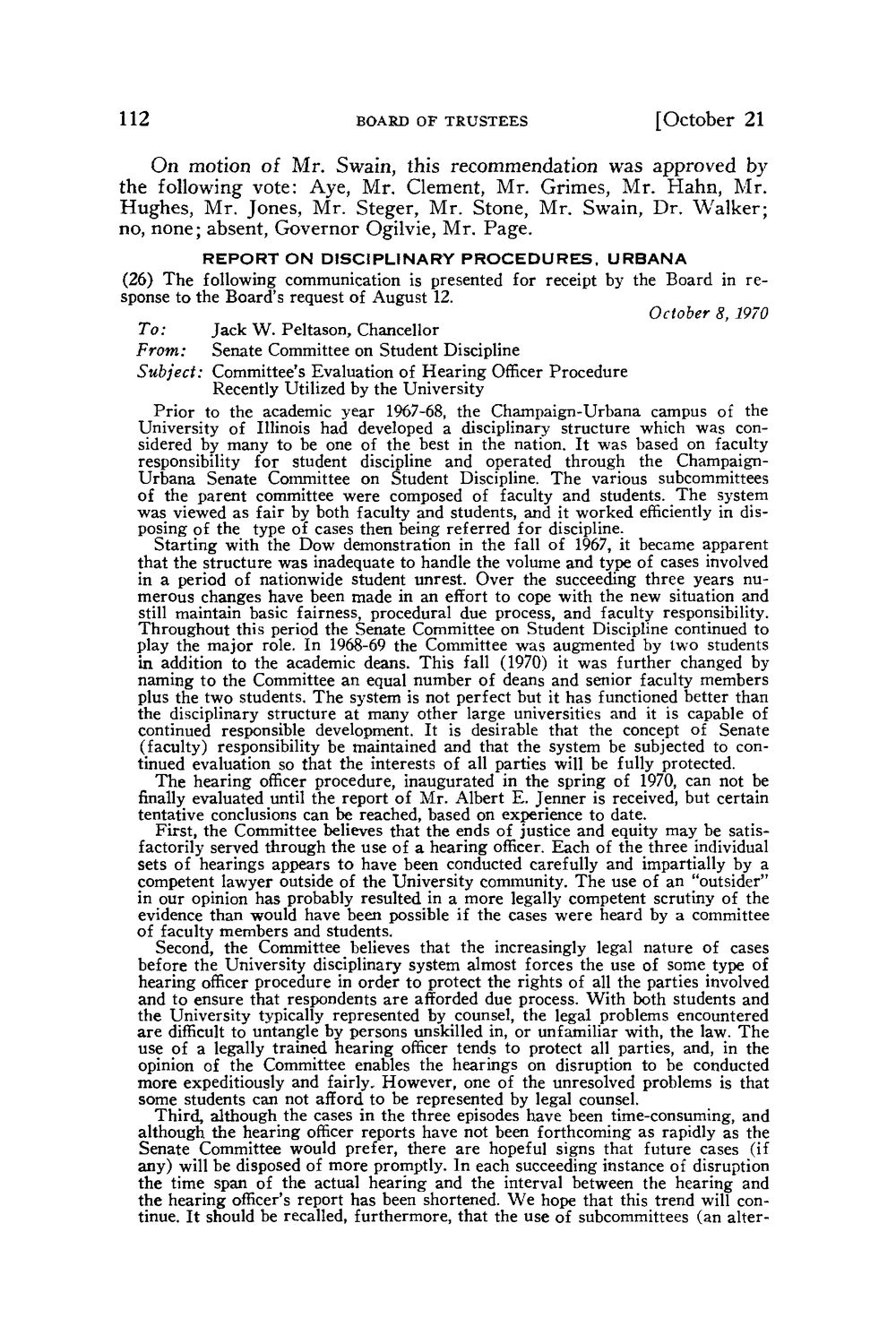| |
| |
Caption: Board of Trustees Minutes - 1972
This is a reduced-resolution page image for fast online browsing.

EXTRACTED TEXT FROM PAGE:
112 BOARD OF TRUSTEES [October 21 On motion of Mr. Swain, this recommendation was approved by the following vote: Aye, Mr. Clement, Mr. Grimes, Mr. Hahn, Mr. Hughes, Mr. Jones, Mr. Steger, Mr. Stone, Mr. Swain, Dr. Walker; no, none; absent, Governor Ogilvie, Mr. Page. REPORT ON DISCIPLINARY PROCEDURES, URBAN A (26) The following communication is presented for receipt by the Board in response to the Board's request of August 12. October 8, 1970 To: Jack W . Peltason, Chancellor From: Senate Committee on Student Discipline Subject: Committee's Evaluation of Hearing Officer Procedure Recently Utilized by the University Prior to the academic year 1967-68, the Champaign-Urbana campus of the University of Illinois had developed a disciplinary structure which was considered by many to be one of the best in the nation. It was based on faculty responsibility for student discipline and operated through the ChampaignUrbana Senate Committee on Student Discipline. The various subcommittees of the parent committee were composed of faculty and students. T h e system was viewed as fair by both faculty and students, and it worked efficiently in disposing of the type of cases then being referred for discipline. Starting with the Dow demonstration in the fall of 1967, it became apparent that the structure was inadequate to handle the volume and type of cases involved in a period of nationwide student unrest. Over the succeeding three years numerous changes have been made in an effort to cope with the new situation and still maintain basic fairness, procedural due process, and faculty responsibility. Throughout this period the Senate Committee on Student Discipline continued to play the major role. In 1968-69 the Committee was augmented by two students in addition to the academic deans. This fall (1970) it was further changed by naming to the Committee an equal number of deans and senior faculty members plus the two students. The system is not perfect but it has functioned better than the disciplinary structure at many other large universities and it is capable of continued responsible development. It is desirable that the concept of Senate (faculty) responsibility be maintained and that the system be subjected to continued evaluation so that the interests of all parties will be fully protected. The hearing officer procedure, inaugurated in the spring of 1970, can not be finally evaluated until the report of Mr. Albert E. Tenner is received, but certain tentative conclusions can be reached, based on experience to date. First, the Committee believes that the ends of justice and equity may be satisfactorily served through the use of a hearing officer. Each of the three individual sets of hearings appears to have been conducted carefully and impartially by a competent lawyer outside of the University community. The use of an "outsider" in our opinion has probably resulted in a more legally competent scrutiny of the evidence than would have been possible if the cases were heard by a committee of faculty members and students. Second, the Committee believes that the increasingly legal nature of cases before the University disciplinary system almost forces the use of some type of hearing officer procedure in order to protect the rights of all the parties involved and to ensure that respondents are afforded due process. With both students and the University typically represented by counsel, the legal problems encountered are difficult to untangle by persons unskilled in, or unfamiliar with, the law. T h e use of a legally trained hearing officer tends to protect all parties, and, in the opinion of the Committee enables the hearings on disruption to be conducted more expeditiously and fairly. However, one of the unresolved problems is that some students can not afford to be represented by legal counsel. Third, although the cases in the three episodes have been time-consuming, and although the hearing officer reports have not been forthcoming as rapidly as the Senate Committee would prefer, there are hopeful signs that future cases (if any) will be disposed of more promptly. In each succeeding instance of disruption the time span of the actual hearing and the interval between the hearing and the hearing officer's report has been shortened. W e hope that this trend will continue. It should be recalled, furthermore, that the use of subcommittees (an alter-
| |